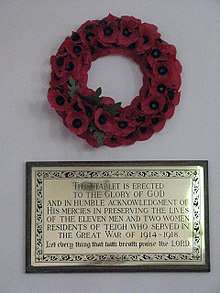Thankful Villages
Thankful Villages (also known as Blessed Villages; Welsh: Pentrefi Diolchgar)[1][2] are settlements in England and Wales from which all their members of the armed forces survived World War I. The term Thankful Village was popularised by the writer Arthur Mee in the 1930s; in Enchanted Land (1936), the introductory volume to The King’s England series of guides, he wrote that a Thankful Village was one which had lost no men in the Great War because all those who left to serve came home again. His initial list identified 32 villages. There are tens of thousands of villages and towns in the United Kingdom.

In an October 2013 update,[3] researchers identified 53 civil parishes in England and Wales from which all serving personnel returned. There are no Thankful Villages identified in Scotland or Ireland yet (all of Ireland was then part of the United Kingdom).[4]
Fourteen of the English and Welsh villages are considered "doubly thankful", in that they also lost no service personnel during World War II.[4] These are marked with a (D) in the list below (note: while the list includes 17 of these, not all have been verified).
List of Thankful Villages
The researchers acknowledged a number of other villages which have been put forward as Thankful Villages but where they found there to be some uncertainty, generally over the place of residence of a serviceman.[3]
England
|
|
Wales
- Ceredigion
- Glamorgan
- Pembrokeshire
- Herbrandston (D)[6]
Tavernspite, in Pembrokeshire, has been mooted as a fourth doubly thankful village in Wales.[7]
France
In France, where the human cost of war was higher than in Britain, Thierville in Upper Normandy was the only village in all of France with no men lost from World War I. Thierville also suffered no losses in the Franco-Prussian War and World War II, France's other bloody wars of the modern era.[8][9]
In popular culture
On 3 June 2016 singer-songwriter Darren Hayman released the first of three albums inspired by and written in-situ at the Thankful Villages. 54 villages were covered, including Welbury, North Yorkshire, not in the 53 listed above.[10][11]
References
- "Taith i gofio 'pentrefi diolchgar' (Tour in remembrance of "thankful villages")". BBC News (in Welsh). Retrieved 8 November 2018.
- St Cyrus – an example of the use of "Blessed Villages" in section 'St Cyrus War Memorial' of the St Cyrus Newsletter, October/ November 2007, at mearns.org/stcyrus Accessed 11 November 2017
- Norman Thorpe, Rod Morris and Tom Morgan. "The Thankful Villages". Hellfire corner. Retrieved 5 November 2013.
- Kelly, Jon (11 November 2011). "Thankful villages: The places where everyone came back from the wars". BBC News Magazine. BBC News. Retrieved 12 November 2011.
- Pask, Brenda (1990). Allington: The Story of a Lincolnshire Village. ISBN 0951688804.
- Hume, Colette (8 November 2018). "Wales' two 'doubly thankful' villages". BBC News. Retrieved 8 November 2018.
- "Could Tavernspite be a "Thankful Village"?". Tenby Observer. 9 December 2011. Retrieved 8 November 2018.
- Jérôme Duhamel (Paris 1990). Grand Inventaire du Génie Français, p. 196: "Between 1919 and 1925, a war memorial was erected in every community in France, with one single exception: the village of Thierville in the department of the Eure, the only French village which had no dead to mourn, not in 1870, nor in 14–18, nor in 39–45" Also quoted in Thorpe, Morris and Morgan's "The Thankful Villages" referenced above.
- Kelly, Jon (11 November 2011). "Thankful villages: The places where everyone came back from the wars". BBC News. Retrieved 9 November 2018.
- "We Lucky Few". i (newspaper). 31 May 2016. Retrieved 16 July 2016.
- Petridis, Alexis (12 July 2016). "Darren Hayman: No sleep till Upper Slaughter". The Guardian. Retrieved 16 July 2016.